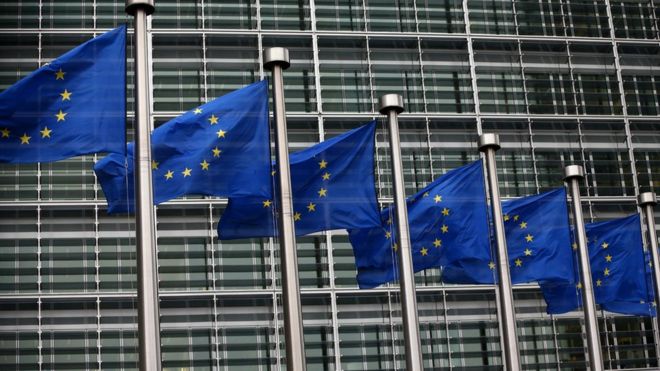EU Big Five launch tax crackdown

The five largest economies in the European Union have agreed to share information on secret owners of businesses and trusts.
It is a concerted attempt to show their leaders are responding to public concern over the Panama Papers leak.
The UK, Germany, France, Italy and Spain have agreed to the data exchange.
Treasury officials told the BBC the move would make it harder for businesses and wealthy individuals to operate without paying correct taxes.
Information on the ultimate "beneficial owners" of companies and trusts would now be automatically exchanged.
The five countries are now pushing for the rest of the G20 nations with the world's largest economies to follow suit.
That would mean data exchange on previously secret tax information between countries such as America, Saudi Arabia and China.
Some might see any such extension as unlikely.
The UK government has already announced that it will make its register of beneficial ownership public — and is privately urging the other four signatories of the deal to agree that the public can have access to the information.
"Today we deal another hammer blow against those who hide their illegal tax evasion in the dark corners of the financial system," Mr Osborne said at the annual International Monetary Fund spring meeting in Washington.
"Britain will work with our major European partners to find out who really owns the secretive shell companies and trusts that have been used as conduits for evading tax, laundering money and benefitting from corruption."
The exchange is unlikely to placate critics who say that not enough has been done to crack down on global tax avoidance and tax evasion, often via offshore trusts and companies based in tax havens.
'Working together'
Jeremy Corbyn, the Labour leader, has suggested that some tax havens under British jurisdiction such as the British Virgin Islands should face direct rule from the UK if they do not reform their tax laws.
The move on data exchange comes ten days after the leak of 11.5 million documents known as the Panama Papers which revealed how some businesses and wealthy individuals avoided and evaded tax using complicated networks of highly secretive companies.
"It is Britain and our European partners setting the pace on beneficial ownership transparency of not just companies but also trusts with tax consequences — and I expect that the rest of the world will move to follow our example," Mr Osborne said.
"It shows the benefit of working together. No single country can tackle international tax evasion alone — and Britain should never fool itself into thinking that it can do this by itself."
The agreement was announced at an unprecedented joint press conference of the finance ministers of the five EU countries at the IMF.
Mr Osborne was joined by Wolfgang Schauble of Germany and Michel Sapin of France.
Also at the announcement was Christine Lagarde, managing director of the IMF, and Angel Gurria, Secretary General of the OECD, the international body charged with setting new global tax rules on information sharing and transparency.
Политика конфиденциальности | Правила пользования сайтом








